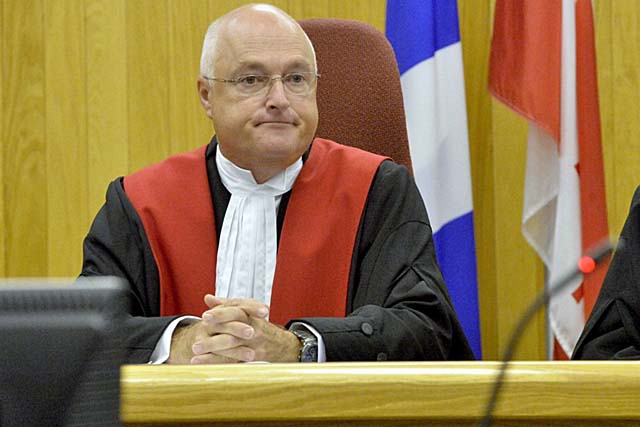
on Sixth Day of Deliberations
Sherbrooke Quebec - The jurors at the Lake Megantic trial told the judge Tuesday they are at an impasse in their deliberations.
Quebec Superior Court Justice Gaetan Dumas read a letter in which the jurors asked him what would happen if they couldn't reach unanimity.
"We are at an impasse," Dumas said, referring to the letter.
"What happens if we can't arrive at a unanimous decision?"
The jurors are deliberating the fate of Tom Harding, Richard Labrie, and Jean Demaitre.
The three were charged with criminal negligence causing the 2013 tragedy that killed 47 people when a runaway train carrying crude oil derailed and exploded.
After receiving the letter, Dumas told the lawyers in the case he could "exhort" the jurors to resume their deliberations and to consider the possibility of delivering verdicts on one, two, or all three accused.
The discussion in the room before he suspended procedures was that he would send them back to deliberate.
Dumas was expected to address the jury later in the day.
Before the jurors began deliberating last Thursday, Dumas told them the verdict for each of the accused had to be unanimous.
All three men can be found guilty of criminal negligence causing the death of 47 people, while jurors have the option of convicting Harding on one of two other charges, dangerous operation of railway equipment, or dangerous operation of railway equipment causing death.
Harding was the train's engineer, Labrie the rail traffic controller, and Demaitre the manager of train operations.
The three men each pleaded not guilty to one count of criminal negligence causing the death of 47 people.
None of them presented a defence at the trial, but lawyers for each told the jury in turn the Crown had failed to meet its burden of proof.
The prosecution mounted a case that the three were each criminally negligent in their own way for failing to ensure the train was safe before the wee hours of 6 Jul 2013.
That's when the locomotive and its cargo of crude oil from the United States rolled away and derailed in Lake Megantic, exploding and then killing the 47 people as well as destroying part of the downtown core.
The Crown argued that Harding's role was a significant one because he didn't apply a sufficient number of brakes after parking the oil-laden convoy for the night in nearby Nantes.
That left the locomotive, which weighed more than 10,000 tonnes, resting precariously on a slope 10 kilometres away from downtown Lake Megantic.
Harding applied only half the required level of brakes and didn't test them to ensure they worked properly before leaving for the night.
One of Harding's lawyers countered that the rail disaster was an accident resulting from a perfect storm of unforeseeable events.
"We can't hold people criminally responsible for not being perfect," Charles Shearson told the court.
Shearson said Harding admitted to not conducting a proper brake test and failing to apply a sufficient number of handbrakes, which would have prevented the train from moving after its engine was shut off.
He suggested that evidence presented during the trial demonstrated the Montreal Maine & Atlantic railway (MMA) didn't require its employees to perform brake tests perfectly in line with the federal regulations.
And Harding could not have foreseen the locomotive would catch fire after he left for the night, the lawyer added.
Firefighters extinguished a blaze at the lead locomotive shortly before the tragedy and cut the engine, which meant the air brakes were not functioning.
The prosecution also blamed Labrie and Demaitre, arguing their responsibilities included taking the necessary steps to avoid injuries and loss of life the night before the derailment.
The prosecution claimed neither man deemed it necessary to check with Harding to see how many handbrakes had been applied and whether tests had been conducted.
Demaitre's lawyer, Gaetan Bourassa, argued his client had no say in safety-related decisions made in the United States by MMA's parent company.
Labrie's lawyer, Guy Poupart, argued his client had a limited role in the tragedy.
He also played up the testimony of several witnesses who described him as competent and reliable and someone they trusted.
As well, he noted that a good portion of the Crown's case did not involve Labrie.
Giuseppe Valiante.
under the provisions in
Section 29 of the Canadian
Copyright Modernization Act.



